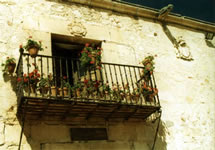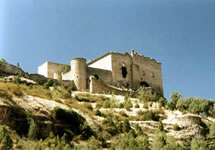 The first morning in Miraflores, we drove north through pine tree-studded hills to the medieval town of Pedraza. The summer feria was winding down, with drunken revelers still stumbling through the cobblestoned streets.
The first morning in Miraflores, we drove north through pine tree-studded hills to the medieval town of Pedraza. The summer feria was winding down, with drunken revelers still stumbling through the cobblestoned streets.Marián and I were hungry but we had to save our appetites for a delicious lunch of roasted suckling pig, the local specialty. So to stave off our hunger, we stopped at the only open bakery in town, a tiny storefront where she ordered a few bollos to go.
My eyes widened in astonishment but I said nothing. She ordered what? In Miami, my hometown, Cubans use the word bollo (pronounced bo-yo) to refer to a section of the female reproductive system that Americans would usually identify with the “p” word. As with its American counterpart, the Cuban “b” word is used only when the speaker wishes to be deliberately vulgar, most certainly never in polite company!
To tell you the truth, I really didn’t care what this bread roll was called. It was my first morning in Spain. I was still recovering from jet lag, a mild hangover and I felt light-headed under the hot August sun. I had to take a bite out of this bollo immediately just to keep my blood sugar from dropping. There simply wasn’t time to discuss the finer points of variations in the Spanish lexicon.
 As I chewed on the soft, sweet roll and surveyed the stone exterior of Pedraza’s castle, I mulled over another mundane metaphor. The night before we had dined on conejo al ajillo (rabbit stewed with garlic sauce). This was a messy meal with bits of tender meat chewed right off the bone and sauce slopped up from the plate with crusty bread. No sooner had the waiter filled our glasses with the second bottle of Rioja the jokes were flying. Marián’s friend, Manuel -- who had as much delicacy at the table as a rutting bull -- was kind of enough to explain that the word for rabbit also referred to a “highly prized” part of a woman’s body. So I was beginning to get the hang of it: when in Spain, you eat with innuendo, my friends, not just with gusto!
As I chewed on the soft, sweet roll and surveyed the stone exterior of Pedraza’s castle, I mulled over another mundane metaphor. The night before we had dined on conejo al ajillo (rabbit stewed with garlic sauce). This was a messy meal with bits of tender meat chewed right off the bone and sauce slopped up from the plate with crusty bread. No sooner had the waiter filled our glasses with the second bottle of Rioja the jokes were flying. Marián’s friend, Manuel -- who had as much delicacy at the table as a rutting bull -- was kind of enough to explain that the word for rabbit also referred to a “highly prized” part of a woman’s body. So I was beginning to get the hang of it: when in Spain, you eat with innuendo, my friends, not just with gusto!By the time we left Pedraza, my stomach had stopped growling and I relaxed into the passenger’s seat to enjoy the ride. Imagine my amusement when we passed one town called Rebollo (which translates as “not just a simple bollo, but a really impressive one!”) and another called Sacabollos (which can be interpreted as “get those bollos out, ladies!”). I chuckled quietly under my breath and when asked what was funny I simply sighed and exclaimed, "ah, this is such a sensual country!"
 Even though Marián and her father treated me like I was a member of the family, I didn’t think it was appropriate to bring up the subject of bollo with Carlos in the car. As the day wore on, I became distracted by the landscaped gardens of La Granja and completely forgot about the matter.
Even though Marián and her father treated me like I was a member of the family, I didn’t think it was appropriate to bring up the subject of bollo with Carlos in the car. As the day wore on, I became distracted by the landscaped gardens of La Granja and completely forgot about the matter.The next morning, Carlos woke us up by knocking hard on the door and telling us how much we snored, when in fact, he had snored most impressively throughout the night, echoing through the cool green pastures of the Sierra and keeping the cows, I was sure of it, from peaceful slumber.
Playing the stern father, pretending that we were still young girls and not grown women, he chided us for sleeping late. To prove how late it was he boasted loudly that it was 9:30 AM and that he already had enough time to eat three bollos! I shoved a pillow on my face to contain my laughter. That a sixty-something man could be so busy was impressive!
Later that morning I discreetly explained the story to Marián, who eventually repeated it to everyone she knew in Madrid. And so now there are a handful of Madrileños who smile every morning when they enjoy their café con leche with a warm, fresh-baked bollo.

1 comment:
This is great!
Post a Comment